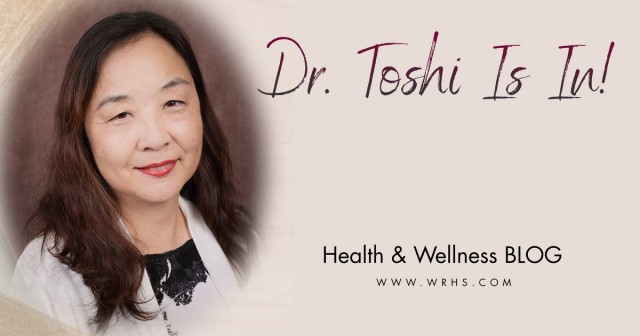Dr. Toshi Is In! "What is osteoporosis?"
Dear Dr. Toshi,
What is osteoporosis?
I'm sure you've heard the word "osteoporosis." So, we'll talk about bone health today because osteoporosis is something to do with our bones.
Do you know how many bones we have in our bodies? Over 200! There are big ones like our femurs (thigh bones; without them we couldn't walk or even stand) and very tiny ones like our stapes (tiny bones in our ears about the size of a grain of rice; without them we'd be completely deaf). Imagine that!
Bones have many other functions, as well. As our skeleton, they provide a framework for our bodies that makes it possible for us to stand and move, as well as protecting internal organs such as our brains and those in the chest like our lungs and heart. They also serve as anchors for our muscles, which is how muscles can move our bodies. They store calcium, too. Also, our bone marrow is made in the center of our large bones such as the bones in our legs and arms, our sternum (breast bone), pelvis, and spine (our vertebrae). Our bone marrow is where our blood cells are made. About 500 billion blood cells are made every day in the bone marrow in our bones! You might be wondering what bone marrow looks like, but you've seen it. It's the stuff in the middle of bones that you see in a steak, or in bones you give your dogs. Our dogs used to love that treat! It's that spongy stuff in the center of the bone.
"Osteo" means bones and "porosis" means full of holes, or porous, just as it sounds. When bones become full of holes (that is, less dense), we call that osteoporosis. If you have osteoporosis, your bones are weaker, so they can break more easily than normal bones. You may have also heard the word "osteopenia," which also means weak, porous bones, but not as bad as osteoporosis; it's when the bones are becoming weaker, so they're between normal and osteoporosis.
Bones are constantly broken down and rebuilt at the microscopic level. Old bone is broken down by a certain type of living bone cells, and new bones are formed by other types of cells. When we're young, there's more bone-building than breakdown. Unfortunately, as we get older, our bodies tend to break down bone more than build new bone. Most people reach their peak bone mass (weight) by age 30!
How likely are we to get osteoporosis? Well, it depends partly on our genetics, and partly on how much bone mass we attained in our youth. And maintaining bone health depends on many lifestyle factors that we can control. Some examples of things that increase our risk of getting osteoporosis include not enough calcium in our diet, drinking too much alcohol (that is, more than two drinks a day for men or more than one drink a day for women), smoking, and not getting enough exercise, to name a few. It's recommended that we engage in both strength training such as weight lifting and also weight bearing exercises such as walking and jogging for stronger, healthier bones.
Unfortunately, there are other factors that we can't really control such as getting old. Also some races (Caucasian and Asians) are more likely to get osteoporosis than other races, and also women tend to get osteoporosis more than men. Long-term use of certain medications, such as the steroid like prednisone, can also increase our risk of getting osteoporosis. Vitamin D is also important since it's needed for the absorption of calcium. As I mentioned in an earlier article, it's possible to take too much of any supplement, including vitamin D and calcium, so it's important to discuss this with your doctor or provider. For example, large amounts of calcium might make our bones stronger, but it can also increase our risk of getting kidney stones.
There is a type of X-ray that measures our bone density, and it's called a "DEXA Scan." It tells us if we have healthy, normal bones, osteopenia, or osteoporosis. Some people with osteopenia and osteoporosis are prescribed medications that can make the bones more dense. So, it's especially important for women to get DEXA scans after menopause and talk with your doctors about treatment options if you have osteopenia or osteoporosis. Treatment is very important to help lower the risk of getting fractures.
Dr. Toshiko ("Toshi") Luckow, MD a Family Physician at the West River Health Services hospital and clinics.
When you subscribe to the blog, we will send you an e-mail when there are new updates on the site so you wouldn't miss them.


Comments